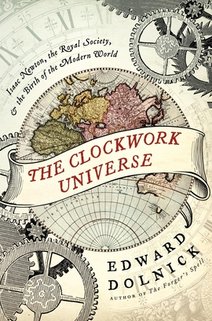
09 Feb 2011 08:22:03
Amid such superstition, a small band of scientists — mostly mathematicians and astronomers — set out to decode the workings of the universe. Deeply religious themselves, they undertook their investigations to prove that God had indeed created a perfect, orderly world — the "clockwork universe" of Dolnick's title.
Yet when these men — Galileo, Kepler, Descartes, Leibniz and most important, Isaac Newton — discovered and described the forces that kept the Earth, the moons and all the planets spinning in their orbits, they inadvertently undermined belief in an all-powerful creator. They made God irrelevant by elevating science and technology, and in doing so, ushered in the modern era.
Dolnick, a former science writer at The Boston Globe, tells this story in short, punchy chapters, using simple language to explain complex ideas in math and physics. He diligently describes conditions at the time — life was nasty, brutish and short, to quote the 17th-century great Thomas Hobbes — to establish what a revolution in thought was under way.
For this reason, the first couple hundred pages of "The Clockwork Universe" feel like an extended introduction, albeit with entertaining digressions about colorful personalities like the diarist Samuel Pepys and satirist Jonathan Swift.
We also learn a great deal about the Royal Society, founded in London in 1660 to promote scientific inquiry, and whose members conducted experiments we would today consider insane (sheep-to-man blood transfusions) or deeply disturbing (dissections of live dogs).
Dolnick's history begins to soar toward the end, when he focuses on Newton and his masterpiece "Principia." In that 500-page work, which he wrote in less than two years, Newton declares his intention to "demonstrate the frame of the System of the World" and proceeds to do so, explicating everything from the motion of the planets, moon and tides to the path of comets and shape of the Earth.
Subramanyan Chandrasekhar, a Nobel Prize-winning astrophysicist who has studied the "Principia" in depth, tells Dolnick that normal scientists can imagine the discoveries of great scientists, even if they were too "stupid" to have thought of them first. "But I don't think it's possible for any scientist to imagine what it would have been like to be Newton," he says.
Yet when these men — Galileo, Kepler, Descartes, Leibniz and most important, Isaac Newton — discovered and described the forces that kept the Earth, the moons and all the planets spinning in their orbits, they inadvertently undermined belief in an all-powerful creator. They made God irrelevant by elevating science and technology, and in doing so, ushered in the modern era.
Dolnick, a former science writer at The Boston Globe, tells this story in short, punchy chapters, using simple language to explain complex ideas in math and physics. He diligently describes conditions at the time — life was nasty, brutish and short, to quote the 17th-century great Thomas Hobbes — to establish what a revolution in thought was under way.
For this reason, the first couple hundred pages of "The Clockwork Universe" feel like an extended introduction, albeit with entertaining digressions about colorful personalities like the diarist Samuel Pepys and satirist Jonathan Swift.
We also learn a great deal about the Royal Society, founded in London in 1660 to promote scientific inquiry, and whose members conducted experiments we would today consider insane (sheep-to-man blood transfusions) or deeply disturbing (dissections of live dogs).
Dolnick's history begins to soar toward the end, when he focuses on Newton and his masterpiece "Principia." In that 500-page work, which he wrote in less than two years, Newton declares his intention to "demonstrate the frame of the System of the World" and proceeds to do so, explicating everything from the motion of the planets, moon and tides to the path of comets and shape of the Earth.
Subramanyan Chandrasekhar, a Nobel Prize-winning astrophysicist who has studied the "Principia" in depth, tells Dolnick that normal scientists can imagine the discoveries of great scientists, even if they were too "stupid" to have thought of them first. "But I don't think it's possible for any scientist to imagine what it would have been like to be Newton," he says.

